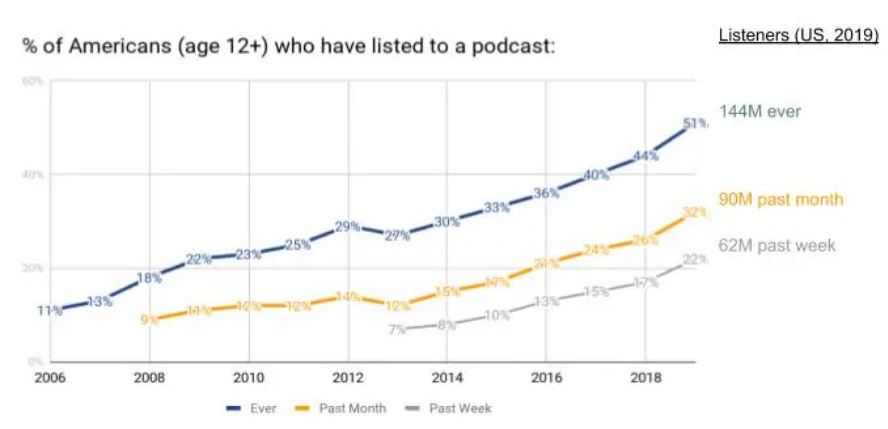🧸 wagmi: What Crypto-Bears Miss
Why Stephen Diehl is Wrong + How Spotify Stole Podcasts from Apple
EDIT in June 2023: It seems Stephen was actually right about a lot of this! I’m happy to admit when I was wrong. I’ll keep the article just for history’s sake…
50 thousand favorites of a Tweet is not a normal thing. While crypto bears are everywhere, Stephen Diehl has become the standard bearer for the position. His threads are written with the wit of David Foster Wallace and the techno-philosophical prose of Michael Crichton. And, boy, do they perform.
With Twitter’s average engagement rate of 1%, that Tweet likely had 5M+ views. That is massive distribution. It is Elon Musk or Donald Trump level. For reference, Twitter Celebrity Patrick Collison, the CEO of Stripe with 3.5x the followers, would be happy to have a few thousand likes.
It is not just Stephen’s threads that perform. His blog posts are also widely shared and read.
If the weighing scale for an argument’s quality were its Tweet likes, then Stephen would have very solid arguments.
They sure are fun to read. Take this gem from one of his popular articles, web3 is bullshit:
Yet when those of us who are in the chips, bits and packets business look into alleged engineering details they’re always either complete hand wavy woo woo or dreams overleveraged on perpetually-over-the-horizon blockchain tech searching for tomorrow’s problem to justify an investment today. Just buy my token today to secure your stake in a better tomorrow. It’s the age-old pitch of charlatans and snake oil salesmen, except this time around it’s being pushed by world’s largest investors who have deep bags of tokens to dump.
The colorful language is to the point of philosophy or fiction. “Chips, bits and packets” is another way to say ‘engineer.’ “Hand wavy woo woo,” could be ‘hollow,’ and “dreams overleveraged on perpetually-over-the-horizon,” could be ‘dreams.’ Far from Hemingway or Adams’ calls for simple language, Diehl goes over the top to help engorge you in the details.
Full disclaimer: I love it. This article was, in part, an excuse to relish in Stephen’s masterful use of language. It is reading theater, more Tucker Max than Packy McCormick.
But either Stephen is onto something that trillions of dollars is not, or there are flaws in his arguments. Alas, any good argument needs a strong opponent, so let’s explore:
Stephen Diehl’s Core Arguments
Blockchain: The Importance of Decentralization
NFTs: Why Artists’ Power Matter
DAOs and web3: How Ownership Will Change the World
Stephen Diehl’s Motivations
How Spotify Stole Podcasting from Apple
Since Apple introduced the world to podcasts in June, 2005, the medium has been on an unstoppable ascent. That same year it was New Oxford American Dictionary’s Word of the Year.
By 2006, 11% of Americans 12+ tried listening to the bite sized audio delivered over the internet. Today, that number is 57%. And more than a third of Americans have listened to a podcast in the past month.
Generally, throughout the history of podcasting, Apple has been the top dog. Most podcast listeners started there, so they tend to stay there.
That is not for lack of competitors trying. Airr is one example of a podcasting app focused on clipping highlights as written notes for later that hits a niche audience well. It has wonderful design, as well as transcripts of almost every podcast I listen to. It even has 3x speed, which, as a former policy debater and daily article writer, I use frequently.
But, for the vast majority of users in the Apple ecosystem, that has not been the case. Apps like Stitcher (which was acquired by SiriusXM for $325M in 2020) and Breaker exist, but the majority of users have historically gone with the podcasts app. It is naturally bundled with each iOS, and reinstalled if you remove it. Being an Apple app, it integrates well with Carplay and Airpods.
Plus, Apple has continued to innovate. Each edition of iOS came with a set of major feature releases to the podcast app. Even relatively small iOS updates like 14.6 came with huge updates to the podcasts app. This continued product development has kept the app fresh, and hard for anyone to compete against.
That has made podcasts an unsung winner for Apple for many years, a future profit center that it had barely explored. That was until Daniel Ek, the CEO of Spotify, set his eye on the podcasting market. In June 2018, he boldly announced the company would spend $500M to invest in growing its podcasting business.
Just three years later, the efforts have borne fruit. Spotify just passed Apple for monthly active podcast listeners, and it is set to vastly outgrow Apple over the coming years. By 2023, analysts expect Spotify to have 30% more MAU than Apple.
It is a trend that has surprised even the smartest tech analysts. But just how did Spotify steal podcasts from under Apple’s nose? Especially when it was so public about its intentions? Let’s find out. To get there, let’s explore:
Apple’s Role in the History of Podcasting
Podcasting’s Value Chain
Spotify’s Strategy
Apple’s Response
Along the way, we’ll focus on tips for product builders and growth architects. After all, who doesn’t want to compete in a big market like podcasts - and win?




"The most well-known and prominent part of Spotify’s podcasting strategy is exclusives."
My memo: This is a very clear strategy. On Glasp, choosing which sentence to highlight and what notes to leave are individualistic which is exclusive content. So, people come to the tool to see the followings' notes such as friends or influencers. And note-leavers can earn a type of financial reward, i.e. money or token, by sharing their insights, opinion, and thoughts. Will look back at this sentence again.
Ref: https://share.glasp.co/kei/?p=XMgbWVjGqepFCB40Rmxp